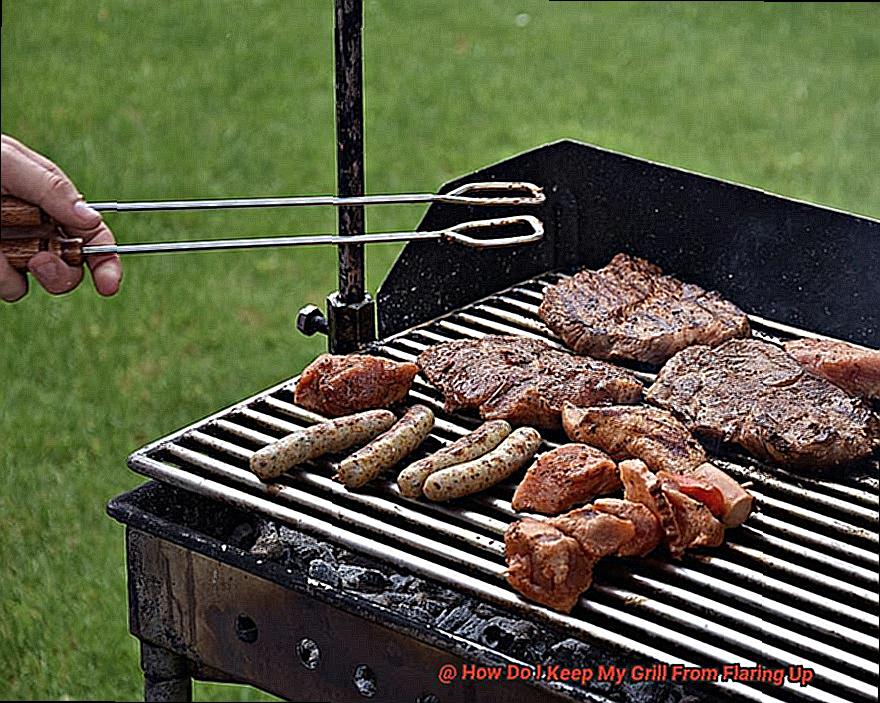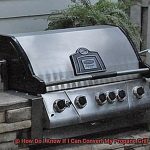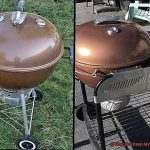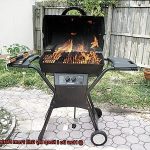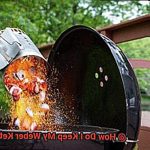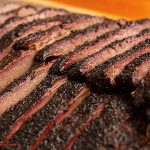Grilling is a universal pastime that ignites the senses and tantalizes taste buds.
The sizzle of meat on the grill and the aroma wafting through the air can make even the most discerning palate drool with anticipation. But, let’s face it, sometimes things don’t go as planned, and your grilling adventure turns into a blazing inferno.
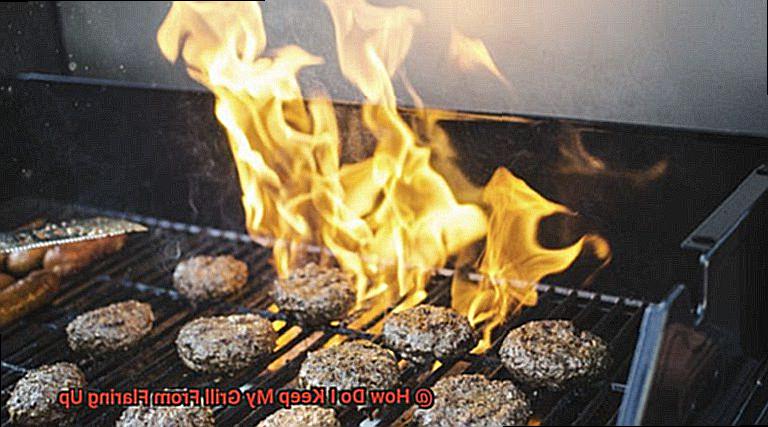
One of the most frustrating issues that grillers encounter is flare-ups. These pesky occurrences happen when fat or juices drip onto the flames, creating an intense burst of fire and smoke that can ruin your meal and be downright dangerous.
But fear not. There are several ways to prevent flare-ups and ensure a stress-free grilling experience for all.
Whether you’re a seasoned pro or just getting started, knowing how to avoid these fiery mishaps is essential. In this blog post, we’ll explore various tips and tricks to keep your grill from flaring up.
So, grab a cold beverage, kick back, and let’s get started on keeping those flames in check.
Contents
What is Flaring Up and Why is it a Problem?
Flaring up is a common occurrence when grilling, and it can lead to ruined food, safety hazards, and uneven cooking. But fear not. By understanding why flare-ups happen and how to prevent them, you can ensure that your grilled meals turn out perfect every time.
One of the main problems with flaring up is that it ruins the taste and texture of your food. Charred and burnt spots can leave your meat or vegetables with an unpleasant taste that no amount of seasoning can fix. And let’s face it, nobody wants to bite into a piece of chicken only to find it’s raw on the inside and burnt on the outside.
But the issue goes beyond just taste and texture. Flare-ups can also be a safety hazard. If the flames are too large or uncontrollable, they can cause serious injury to the person grilling or anyone nearby. This is especially true if you’re using a gas grill, where there is a risk of gas explosions or fires if the flames get out of control.
Another problem with flaring up is uneven cooking. When flames are too high, they cook the outside of your food quickly while leaving the inside underdone. This can be especially problematic if you’re grilling thick cuts of meat that require even cooking throughout to ensure they’re safe to eat.
So how do you prevent flare-ups? First and foremost, keeping your grill clean and well-maintained is crucial. Scraping off any leftover food particles and debris from the grates using a grill brush before each use will prevent grease buildup, which is a common cause of flare-ups. Additionally, removing any excess ash or charcoal from the bottom of the grill before starting your fire will ensure even heat distribution.
Controlling the heat of your grill is another way to prevent flare-ups. Cooking at high temperatures causes fat to drip onto the flames, resulting in sudden bursts of fire. To avoid this, try cooking your food on a lower heat setting and allowing it to cook more slowly. This gives the fat ample time to render off without causing flare-ups.
Using a drip tray or foil can also help prevent flare-ups. Simply place a tray or foil underneath your grates to catch any drippings from your food. This not only prevents flare-ups but also makes cleaning up easier.
Keeping Your Grill Clean and Well-Maintained
As the summer months approach, grilling becomes a staple activity for many households. The aroma of perfectly grilled meats and vegetables fills the air, but nothing can ruin the experience more than flare-ups caused by a dirty and poorly maintained grill. To prevent this, it is crucial to keep your grill clean and well-maintained to ensure safe and delicious meals every time you fire it up.
The accumulation of grease and food debris on the grates and inside the grill is a major cause of flare-ups. Therefore, after each use, take the time to scrape off any food debris from the grates using a grill brush or scraper. Next, remove the grates and scrub them with warm soapy water. Rinse them thoroughly and let them dry completely before placing them back in the grill.
Cleaning the grates alone is not enough to prevent flare-ups; it is also important to clean the inside of the grill. Ensure that any leftover ashes or debris from previous uses are removed. You can use a vacuum or a brush to remove these particles. Then, wipe down the interior of the grill with a damp cloth or sponge.
Maintaining the burner tubes and ports is another important step in preventing flare-ups. Over time, these can become clogged with grease or other debris causing uneven flames and flare-ups. To clean them, turn off the gas supply and remove the burners. Use a wire brush or pipe cleaner to clear any blockages in the tubes and ports.
In addition to cleaning your grill, proper maintenance is essential for keeping it in good working condition. Check for gas leaks, inspect hoses and fittings, and replace any worn or damaged parts regularly. By doing this, you can prevent flare-ups and ensure safe and enjoyable grilling experiences.
Controlling the Heat of Your Grill
Summer is here and that means it’s time to break out the grill and enjoy some mouth-watering outdoor cooking. However, nothing can ruin the experience like unexpected flare-ups caused by a poorly controlled grill. This is why it’s essential to know how to control the heat of your grill.
The first step in controlling the heat of your grill is preheating it. Preheating not only warms up the grates but also burns off any debris or grease that may be left behind, preventing flare-ups from occurring. Once your grill is preheated, you can begin adjusting the burners and/or positioning your food on the grill.
If you have a gas grill with multiple burners, you can turn one or two burners on high and leave the others on low or off. Doing so creates a hot zone and a cooler zone on your grill, allowing you to move your food around as necessary to prevent flare-ups. Using indirect heat is another method of controlling the heat of your grill. This involves placing your food on the cooler side of the grill and closing the lid. The heat from the hot side of the grill will circulate around the food, cooking it evenly without causing any flare-ups.
Another crucial element of controlling your grill’s heat is keeping an eye on your food while it cooks. If you see any flare-ups starting, move the food to a cooler part of the grill or use a spray bottle filled with water to extinguish the flames.
Using a Drip Tray or Foil
Look no further than the simple and effective solution of using a drip tray or foil.
When cooking meat on the grill, the fat and juices naturally drip down onto the flames, causing them to flare up and potentially burn your food. But by using a drip tray or foil, you can catch these drippings before they hit the flames and prevent flare-ups from occurring.
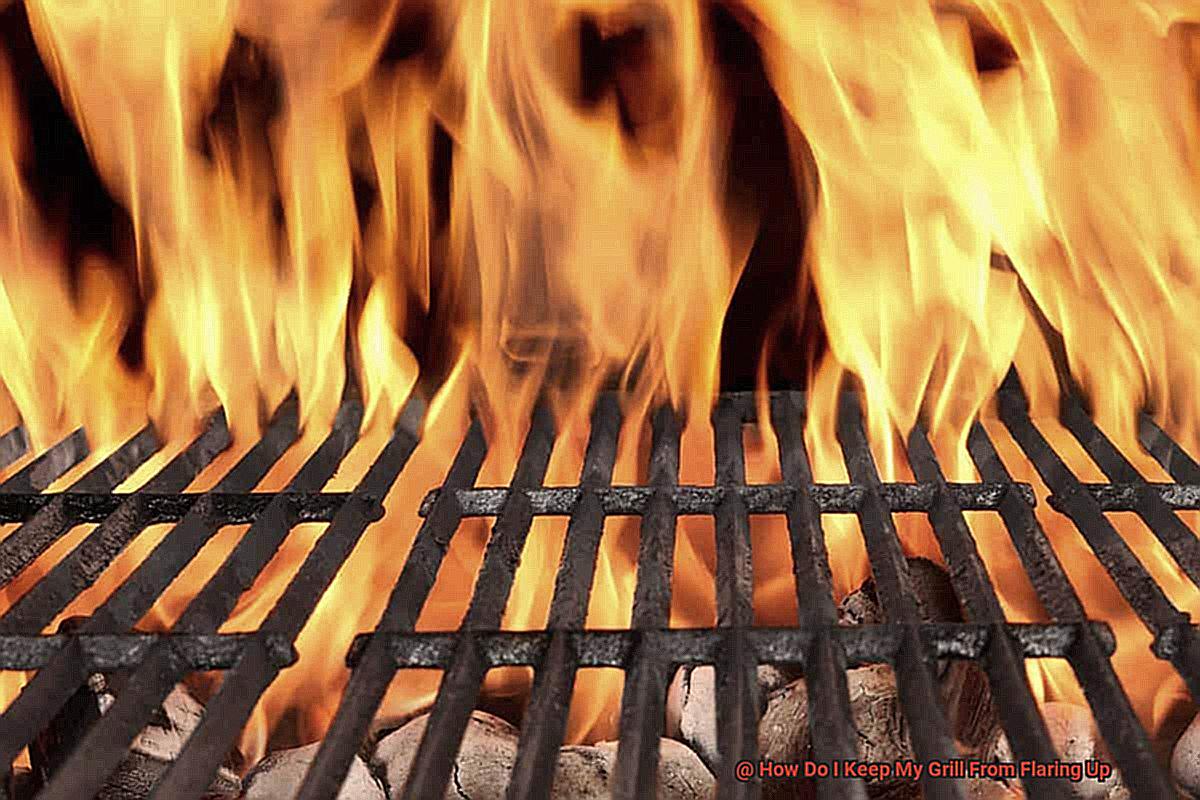
To use a drip tray, it’s as easy as placing it underneath the grates of your grill before cooking. Make sure to select a size that’s large enough to catch all of the drippings from your food. You can either use a disposable aluminum pan or purchase a reusable drip tray specifically designed for your grill. Alternatively, you can fold a piece of heavy-duty aluminum foil into a shallow tray shape and place it underneath the grates of your grill, which is especially useful if you need to adjust the size of the tray depending on what you’re cooking.
Not only does using a drip tray or foil prevent flare-ups, but it also makes cleaning up after grilling much easier. Once you’re finished cooking, simply remove the drip tray or foil and discard it along with any drippings it caught. This saves time and hassle when it comes to cleaning your grill, so you can spend more time enjoying your delicious meal.
In addition to preventing flare-ups and making cleanup easier, using a drip tray or foil also results in perfectly cooked food without burnt spots or uneven cooking caused by flare-ups. Plus, it gives you more control over the cooking process by allowing you to regulate the amount of heat that reaches your food.
Marinating Your Food Before Grilling
Marinating your food before grilling can take your meal from meh to magnificent in no time.
One of the main benefits of marinating is that it helps prevent flare-ups. The acid in the marinade breaks down tough muscle fibers, making the meat more tender and less likely to stick to the grill grates. Plus, the sugar in the marinade creates a caramelized crust on the outside of the meat, which not only looks and tastes amazing but also helps prevent those annoying flare-ups.
When choosing a marinade, it’s important to consider what flavors will complement your meat. A citrus-based marinade works wonders with chicken or fish, while a soy sauce-based marinade is perfect for beef. You can also get creative and experiment with different herbs and spices to create unique flavor combinations.
But don’t forget about timing. Marinate your meat for at least 30 minutes but no more than 24 hours. Over-marinating can have the opposite effect and break down the meat too much, resulting in a mushy mess.
Before placing your marinated meat on the grill, be sure to brush off any excess marinade. This will help prevent flare-ups and ensure that your meat cooks evenly. Keep a watchful eye on your grill while cooking and be prepared to move your food away from any flames if necessary.
Tips for Preventing Flare-Ups
Grilling is a great way to cook and enjoy your food outdoors, but flare-ups can quickly turn your grilling experience into a nightmare. Flare-ups occur when fat and juices drip onto the flames, causing a burst of flame that can burn your food and even damage your grill. Here are five tips you can follow to prevent flare-ups and ensure a successful grilling experience.
Tip 1: Keep Your Grill Clean
A clean grill is essential for preventing flare-ups. Before and after each use, use a wire brush or scraper to remove any leftover food debris and grease from the grates and burners. A clean grill will prevent grease buildup, which is a common cause of flare-ups.
Tip 2: Adjust Your Heat Settings
High heat is often the culprit behind flare-ups, so try lowering the heat a bit to reduce the likelihood of flames shooting up. You may also want to consider using a two-zone fire, where one side of the grill is set to high heat for searing, while the other side is set to lower heat for cooking through. This will give you more control over the heat and reduce the risk of flare-ups.
Tip 3: Choose Leaner Cuts of Meat
Fatty meats like burgers and sausages are more likely to drip fat onto the flames, causing flare-ups. Consider choosing leaner cuts of meat like chicken breasts or fish. If you do want to cook fatty meats, try trimming off excess fat before grilling to reduce the amount of grease that drips onto the flames.
Tip 4: Use a Drip Pan or Foil Tray
Using a drip pan or foil tray under your food can help catch any excess drippings, preventing flare-ups and making cleaning up after your meal much easier. You can place a disposable aluminum pan beneath the grates or purchase a specialized drip pan designed for your grill model.
Tip 5: Be Mindful of Sugary Marinades and Glazes
Certain types of food, such as marinated meats or sugary glazes, are more prone to causing flare-ups due to their high sugar content. Consider using a lower-sugar marinade or brushing on glazes towards the end of the cooking process to minimize the risk of flare-ups.
The Benefits of Preventing Flare-Ups
Grilling is a summertime tradition that many of us look forward to. However, nothing can put a damper on a backyard BBQ faster than flare-ups. Not only can they be dangerous, but they can also result in unevenly cooked and burnt food. As an expert on the topic, I’m here to tell you about the many benefits of preventing flare-ups while grilling, so you can enjoy perfectly cooked and delicious meals with your family and friends.
Firstly, preventing flare-ups leads to better-cooked food. Flames shooting up from your grill can scorch your food, leaving it charred on the outside and undercooked on the inside. By preventing flare-ups, you’ll have more control over the cooking process, allowing you to achieve evenly charred and juicy food that is cooked to perfection.
Another significant benefit of preventing flare-ups is that it results in healthier grilled foods. Fat dripping onto hot coals or burners can cause smoke and potentially harmful chemicals to form. These chemicals can then be absorbed by the food, which isn’t ideal for anyone’s health. By preventing flare-ups, there will be less smoke and fewer harmful chemicals produced, resulting in healthier grilled foods that are better for your overall wellbeing.
Preventing flare-ups can also extend the life of your grill. Flames shooting up from your grill can cause damage to its grates, burners, and other components over time. This damage can lead to costly repairs or even require a new grill altogether. By taking simple steps to prevent flare-ups, such as cleaning your grill regularly and using leaner cuts of meat, you can help prolong the life of your grill and save money in the long run.
In addition to these benefits, preventing flare-ups can make the grilling process more enjoyable for everyone involved. You won’t have to worry about sudden bursts of flames ruining your meal or causing a safety hazard while grilling. Instead, you’ll be able to relax and enjoy the process, knowing that you have taken the necessary precautions to prevent flare-ups.
Conclusion
Grilling is a cherished activity that brings people together, but nothing can sour the experience like flare-ups caused by a grimy and poorly maintained grill. These sudden bursts of fire can ruin your meal and even pose a safety hazard. Luckily, there are several ways to prevent flare-ups and ensure stress-free grilling experiences.
Keeping your grill clean and well-maintained is crucial in preventing flare-ups. Scraping off leftover food particles and debris from the grates before each use will prevent grease buildup, which is a common cause of flare-ups. Additionally, controlling the heat of your grill can also prevent flare-ups. Cooking at high temperatures causes fat to drip onto the flames, resulting in sudden bursts of fire. Using a drip tray or foil can also help prevent flare-ups by catching any drippings from your food.
Marinating your meat before grilling can take your meal from mediocre to magnificent in no time. Marinating helps break down tough muscle fibers and creates a caramelized crust on the outside of the meat, which prevents those pesky flare-ups.
Preventing flare-ups leads to better-cooked food, healthier grilled meals, and extends the longevity of your grill. By taking simple steps like cleaning your grill regularly, using leaner cuts of meat, and controlling the heat of your grill, you can enjoy perfectly cooked and delicious meals with loved ones without worrying about sudden bursts of flames ruining it all.

